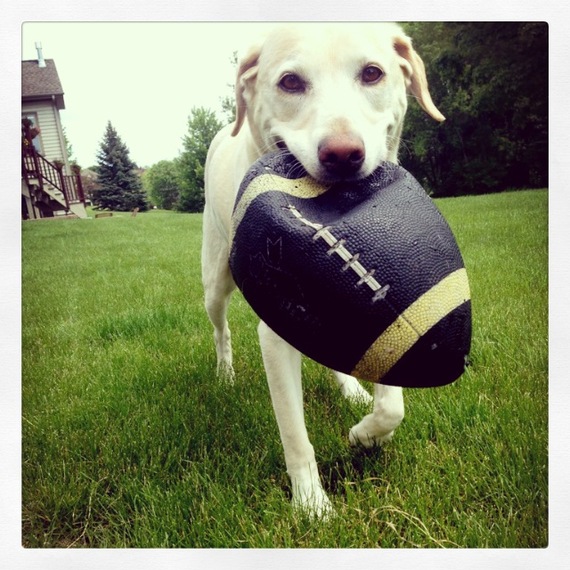A sound I know well: A furry head thumping against wood. My 11-and-change-year-old yellow lab, Willow, crashes through the seemingly closed office door. She's learned over time by driving her head into the wood the pesky barrier between hallway and human is no big deal. I don't have to ask to know why she's arrived, but for traditions sake I humor her with our banter. "What do you want Willybob?" Expertly walking the line between cute and annoying, she woofs a high pitched "Yawrp Yawrp Yawrp!" Easily interpreted as "PLAY WITH ME!"
Play is the gateway to vitality and is as instinctual as our fight or flight response. Stuart Brown, medical doctor, psychiatrist, and founder of The National Institute of Play raves: "By its (play's) nature it is uniquely and intrinsically rewarding. It generates optimism, seeks out novelty, makes perseverance fun, leads to mastery, gives the immune system a bounce, fosters empathy and promotes a sense of belonging and community... It can be accessed and used by everyone and is as important to humans as vitamins or sleep."
Given all the benefits and our inherent ability for play, why we don't play more often?
Human brains are unique in the animal kingdom. Unlike other animals, humans have the ability to pause between stimulus and response. During this pause, we choose how we will respond rather than act on instinct. As an example, when your version of Willow barrels through the door, woofs, and takes a play bow, you get to choose how you will respond. You don't instinctively tell her "No play, I'm busy working." Our ability to choose is a tremendous evolutionary advantage, but works against us when we consistently choose not to play. Collectively as a society, it appears we are slowly being conditioned to eliminate play as a response option.
Brian Sutton-Smith, play researcher and theorist, observed "the opposite of play is not work, it is depression." This means the elimination of play is not the prioritization of work, it is the sentencing of humanity to a lifetime of sadness. Google's dictionary defines play as "an activity engaged in for enjoyment and recreation, especially by children." I couldn't disagree more. Play is not an activity nor is it especially reserved for children; rather, play is an altered state of mind that embodied over time becomes an alternative way of being. Playful people are present in the moment, enjoy their lives, and are not bound to the rigidity of broken social structure. Their way of being leads to meaningful connection, fulfillment, and sparks positive change in our world.
The word play (best pun ever?) has been popping up in my social circle lately, and being a self-declared health and wellness enthusiast, I assumed I was a playful person because I prioritized exercise. Mental box checked and feeling good about myself, I didn't give play much more thought. Then, during a challenging bike "play" up a large hill, it dawned on me I was absolutely hating every second of the ride. There was no way I was playing.
Exercise is defined as "intense physical activity", is synonymous with "work out", and is something added to a daily to-do list to be checked off when we don't succumb to the snooze button. For my fellow exercisers, do not assume your exercise is play (no matter what your yoga teacher tells you in handstand). Exercise in itself is not play, but of course since play is a state of mind, play can certainly be exercise.
We all could use more play in our lives! Take a moment to imagine how you could be more playful.
